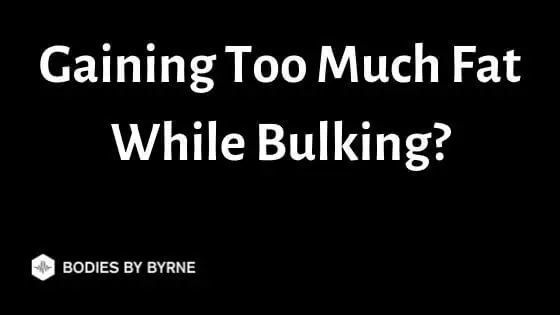Gaining too much fat while bulking? The purpose of a bulk is to consume a calorie surplus to facilitate muscle growth, however a side effect of this is excess body fat gained as a result. To successfully bulk you need to know what your maintenance calorie requirements are and then keep the surplus low enough to prevent unnecessary fat gain.
Bulking is a very tricky area for those looking to improve their physique or performance to try to navigate. With a cut you have a clear goal in mind to burn your body and there are a lot more guidelines in place for a cut then there are for a bulk.
The bulking journey is a lot less straightforward and one of the key reasons why is that there is not a set outline for how much fat gain is acceptable or even optimal when on a bulk. I just need to get on the record and say you will gain body fat when bulking, it is definitely a part of the process.
The issue is however that this is open to interpretation, a healthy body fat percentage of around 12% will look different for most people depending on genetics and where you store body fat the most.
One person could be 12% body fat with a reasonably visible set of abs whereas someone else at 12% might have no visible abs and look physically less aesthetic. This leads to a lot of confusion when it comes to a successful bulking phase.
Table of Contents
Gaining Too Much Fat While Bulking
The number one concern and purpose of this article is whether or not you are gaining too much fat while bulking. If you are into weightlifting for any sort of aesthetic reason, even if it’s to just look like your workout then you’ll be quite sensitive to any sort of fat gain.
The main focus is always on building muscle and you want the majority of your size progress to come from muscle growth, the truth however is that muscle growth is a slow process, especially once you are past the beginner phase.
In the early stages of training you’ll adapt to the new stimulus quickly, better utilise calories and start to build muscle at a quick rate, as you progress past the first year on average you will however see visible gains harder to come by.
It’s at this stage that you will look to commit your time to a dedicated bulking phase and as mentioned you’ll now be in a calorie surplus.
How Much Fat Do You Gain While Bulking
So a calorie surplus will inevitably lead to some fat gained, there is no natural biological way to target muscle growth through surplus calories (I say no natural way as there are of course performance enhancing drugs that certainly can do this).
The more common process is water retention, muscle gain and fat gain. Those with great genetics have an advantage of utilising their nutrients much better and have these shuttled to the muscle as a priority however most will not have a body that efficient and will have some surplus calories stored as body fat.
The key to a successful bulk is therefore to minimize fat gain as much as possible, as the weight gain cannot be specific to one factor like fat; it’s therefore important to use a few key signals.
Scale weight, body measurements at key areas and and the simplest of the all which is the mirror test. In terms of scale weight there is no set amount of weight you can gain to have a successful bulk, it will vary depending on the individual.
If however you are putting on weight at a quick rate (1lb every two weeks is a decent guide) then it’s likely that the majority is coming from fat rather than muscle mass. Gaining 1lb of muscle in a month is something that an intermediate lifter would dream of!
Body tape measurements are also a good indicator of fat gain, especially around certain areas like the abdominal region. Your core muscles are not really built for popping out size so if the measurements go up quickly in this area then it’s likely coming from fat so monitoring measurements will give good indicators.
Finally just looking in the mirror and reviewing your physique weekly will be the best visual indicator. Take pictures at the same location every week and compare them side by side, it’s difficult to notice changes daily but a side by side shot each week will show any drastic changes.
I can’t give an exact amount of fat gain in terms of scale weight however what I can recommend is that you keep your body fat percentage between 12% – 14% on a bulk and absolutely do not go past 15% body fat.
Once you go past 15% you are utilising nutrients far from optimally and are now in the area where you will start to gain more and more fat the more calories you consume in a surplus.
I’ve got a full article that runs through the ideal body fat percentage to be at when lean bulking and it’s a good starting place for a bulking phase.
Is It Normal to Gain Belly Fat While Bulking
Another issue most will struggle with when bulking is gaining belly fat as a result. This is something that is purely genetic and will vary from person to person and it all comes down to where you have a genetic predisposition to storing more body fat.
For a lot of people, particularly males this will unfortunately be you midsection with the trouble areas either being as belly fat or lower back fat. A lot of people have visible veins in their arms even at higher body fat levels and unfortunately for most this will end up being stored as belly fat.
Whilst it is normal to gain belly fat while bulking you still want to monitor this and keep it to an absolute minimum which is where a tape measure will come in handy. I’ve you’ve put an inch on your waist within a month of bulking then you are over consuming calories and need to reign it right back in.
Can You Overeat While Bulking
Do not fall into the trap of eating as much as you possibly can when bulking, this will of course see some benefit in terms of strength and muscle gains however it is far from the optimal approach to take.
The greater the calorie surplus the more likely that you will store a greater proportion as body fat, this is true for everyone including the genetic elite. There is only so much you can burn as energy and use to facilitate muscle growth before the rest is converted to adipose tissue and fat storage.
To prevent overeating you need to track your macros (even loosely) on a bulk and try to keep the surplus between 300kcal – 500kcal of your maintenance calorie requirements. Overeating is definitely a physique killer on a bulk which leads me to the final section which is how to minimize fat gain on a bulk.
How to Minimize Fat Gain While Bulking
Hopefully you now understand that some fat gain is expected when on a bulk and is a necessary part of the process, the key challenge is therefore to make sure you don’t gain too much fat and remember that there are no shortcuts!

It’s a tricky area to navigate if you try to wing it and don’t have a structure in place but if you follow some basic guidelines then you can certainly minimize fat gain on a bulk and really optimize your results.
Track Your Macros
The first thing you need to do is track your macros and this all comes down to working out what your starting macros are going to be. This takes into consideration two things:
- What is your maintenance calorie requirement
- What is your macronutrient split
Once you know your maintenance calorie requirements which is how many calories you need just to maintain weight then, and only then can you plan your surplus. It’s of no benefit to say you’re going to bulk and not know exactly what your starting point is.
By following this approach you could either overshoot your calorie expectations or even worse not consume enough. To work out your maintenance calorie requirements check out this article:
Once you have this down your next step is working out your macro split. A good macronutrient split will ensure that you get a balanced quantity of the necessary nutrients for optimal muscle growth and performance.
A good macro split to follow is the following:
- Protein – 1g per 1lb of body weight
- Fats – 0.45g per 1lb of body weight
- Carbohydrates – Make up from remaining calories
Or a more basic macro split:
- Protein – 30%
- Fats – 15%
- Carbohydrates – 55%
Keep The Calorie Surplus Low
Now that you have your maintenance calorie requirements and have an idea on the macro split that you want to follow the key to minimizing fat gain on a bulk is to keep the calorie surplus low. More calories do not necessarily mean more muscle growth!
Keeping a steady calorie surplus that you evaluate over time is the best approach if your aim is to minimize fat gain. A surplus of 300kcal – 500kcal should be the range that you are looking for to have enough surplus calories for muscle growth whilst not so many that it’s stored as body fat.
It’s definitely a more conservative approach to bulking and a patient approach is needed but this is by far the best approach to minimize fat gain. Something to be aware of is that over time as you gain weight your calorie requirements will need to be revised.
Your body will adapt to a surplus and therefore the calories you finish a bulk with will certainly be higher than what you started with. Therefore you’ll want to adjust them upwards over time but keep the calorie surplus the same.
Track Your Key Indicators
I already covered these earlier so don’t want to repeat this however to minimize fat gain on a bulk you really need to monitor key indicators.
Scale weight, body measurements and progress pictures are the best indicators that we currently have for monitoring fat gain until new technology comes around. These are not costly or time consuming but are essential to implement if you really want to minimize fat gain.
What Next
If you are looking to make changes to your physique by either losing body fat, building muscle or looking to maintain a lean physique then sign up to my weekly newsletter below. Each week I send out actionable tips to help you lose that extra 1lb of fat or build that extra 0.5lb of muscle mass on a weekly basis.
If you sign up now you’ll also receive my 28 day body recomp program completely Free. This ebook will be sent straight to your inbox and will provide an intense 28 day program aimed at helping you lose up to 8lbs of body fat whilst also building 2lb-4lb of lean muscle mass in just 4 weeks.
Don’t worry if you’re not ready for an intense program just yet, my weekly newsletter will give smaller tips that when implemented daily, will stack up over time and see you transform your body with seemingly minimal effort!
Also check out:
https://www.t-nation.com/training/truth-about-bulking
